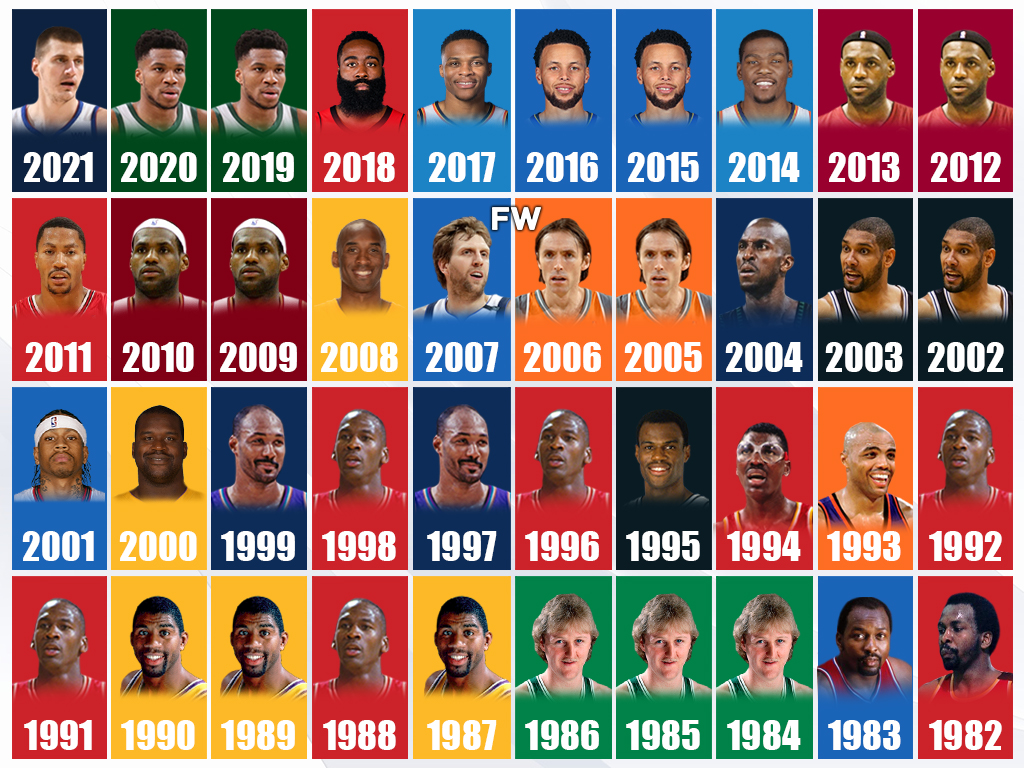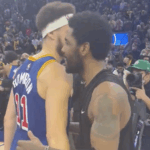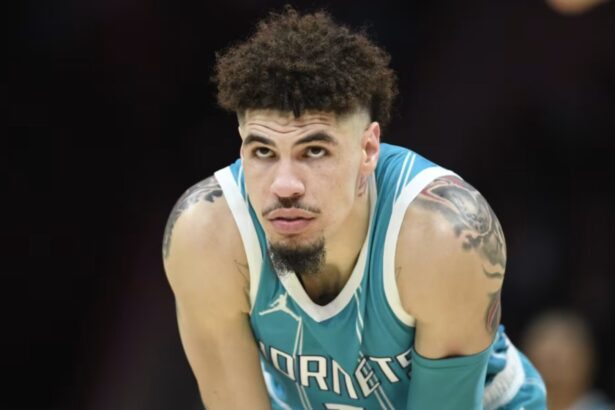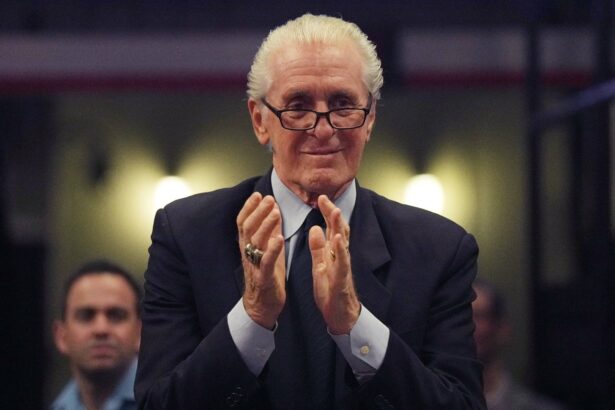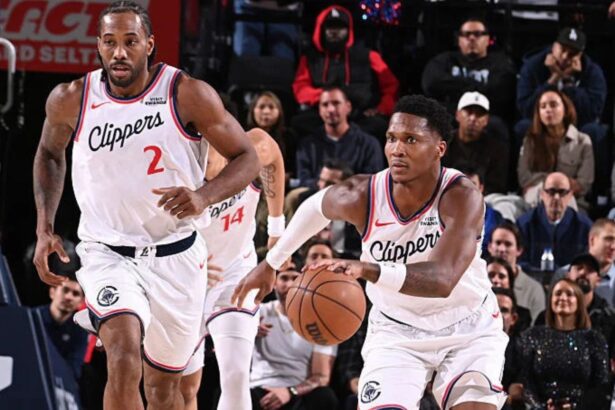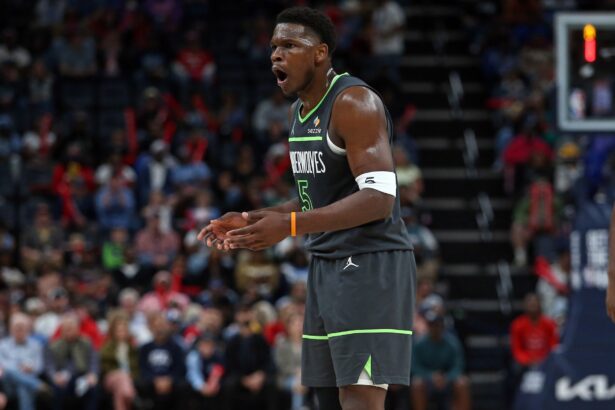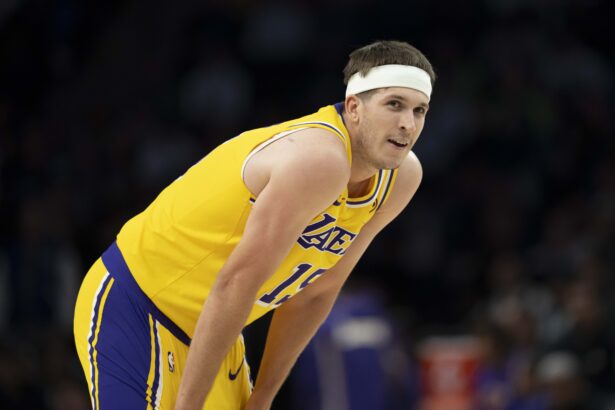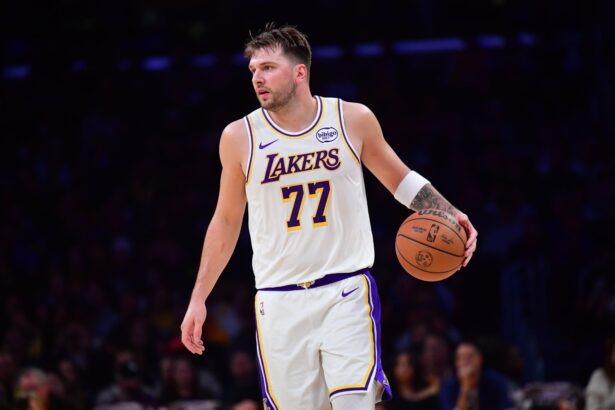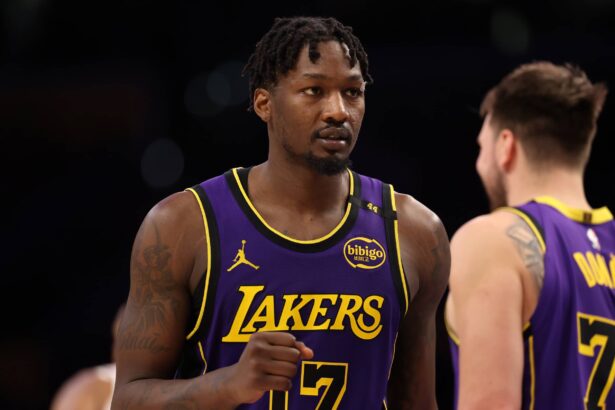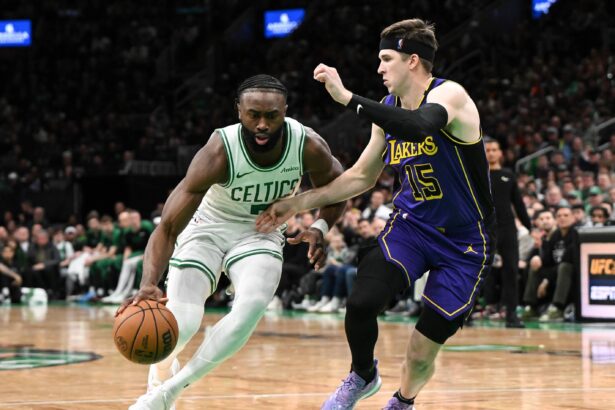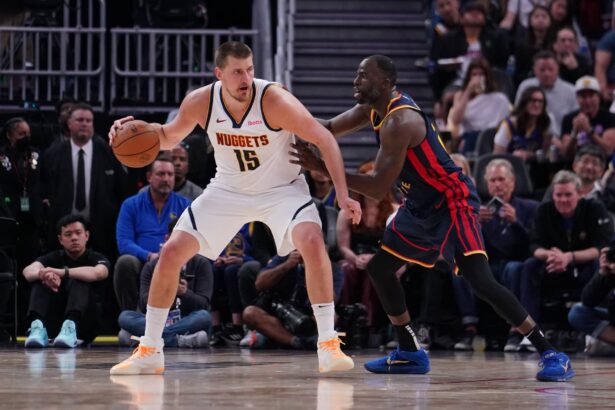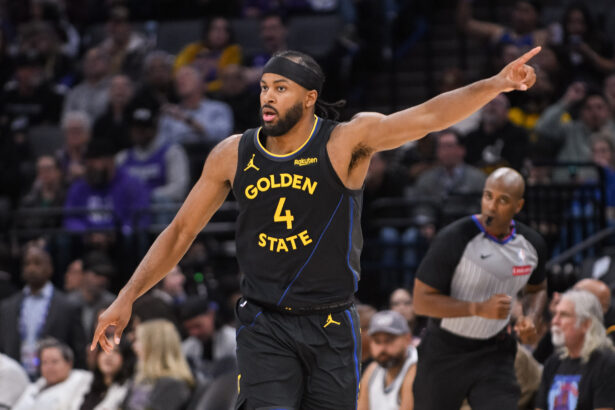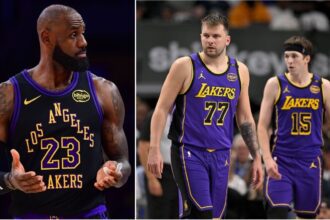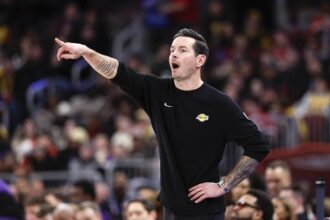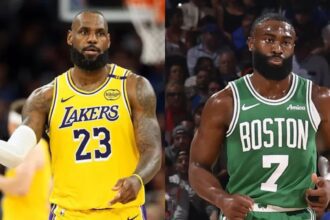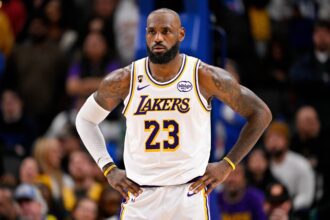One of the most important accolades a player can win is the Most Valuable Player Award. Since only one player is chosen for this award, there is steep competition for being the MVP of your team all season. Not to mention, the NBA is a league full of more than a few superstar players who all probably deserve the MVP Award over the course of 82 games. It takes that little bit extra in terms of performance, production, and winning to get a guy over the hump and capture the prestigious award.
- 1981-82 – Moses Malone, Houston Rockets
- 1982-83: Moses Malone, Philadelphia 76ers
- 1983-84: Larry Bird, Boston Celtics
- 1984-85: Larry Bird, Boston Celtics
- 1985-86: Larry Bird, Boston Celtics
- 1986-87: Magic Johnson, Los Angeles Lakers
- 1987-88: Michael Jordan, Chicago Bulls
- 1988-89: Magic Johnson, Los Angeles Lakers
- 1989-90: Magic Johnson, Los Angeles Lakers
- 1990-91: Michael Jordan, Chicago Bulls
- 1991-92: Michael Jordan, Chicago Bulls
- 1992-93: Charles Barkley, Phoenix Suns
- 1993-94: Hakeem Olajuwon, Houston Rockets
- 1994-95: David Robinson, San Antonio Spurs
- 1995-96: Michael Jordan, Chicago Bulls
- 1996-97: Karl Malone, Utah Jazz
- 1997-98: Michael Jordan, Chicago Bulls
- 1998-99: Karl Malone, Utah Jazz
- 1999-00: Shaquille O’Neal, Los Angeles Lakers
- 2000-01: Allen Iverson, Philadelphia 76ers
- 2001-02: Tim Duncan, San Antonio Spurs
- 2002-03: Tim Duncan, San Antonio Spurs
- 2003-04: Kevin Garnett, Minnesota Timberwolves
- 2004-05: Steve Nash, Phoenix Suns
- 2005-06: Steve Nash, Phoenix Suns
- 2006-07: Dirk Nowitzki, Dallas Mavericks
- 2007-08: Kobe Bryant, Los Angeles Lakers
- 2008-09: LeBron James, Cleveland Cavaliers
- 2009-10: LeBron James, Cleveland Cavaliers
- 2010-11: Derrick Rose, Chicago Bulls
- 2011-12: LeBron James, Miami Heat
- 2012-13: LeBron James, Miami Heat
- 2013-14: Kevin Durant, Oklahoma City Thunder
- 2014-15: Stephen Curry, Golden State Warriors
- 2015-16: Stephen Curry, Golden State Warriors
- 2016-17: Russell Westbrook, Oklahoma City Thunder
- 2017-18: James Harden, Houston Rockets
- 2018-19: Giannis Antetokounmpo, Milwaukee Bucks
- 2019-20: Giannis Antetokounmpo, Milwaukee Bucks
- 2020-21 – Nikola Jokic, Denver Nuggets
- Next
- The Last 40 Scoring Champions: Michael Jordan Is The Best Scorer In NBA History
- The Last 40 Rebounding Champions: Will We Ever See Another Dennis Rodman?
- The Last 40 Assist Champions: John Stockton Is The All-Time Assists King
- The Last 40 Steals Champions: Chris Paul Is The Ultimate ‘Thief’
- The Last 40 Turnover Leaders: James Harden And Russell Westbrook Are Turnover Machines
Since 1955, the MVP Award has been awarded to the best single-player over the regular season each and every year. Most often, although there are some disputes, the MVP award is awarded to both the best player in the league that year along with who provided the most value to their team. We have witnessed some incredible MVP seasons, including record-breaking circumstances and elite production. Here is every single MVP winner over the past 40 years until Nikola Jokic was crowned last year.
1981-82 – Moses Malone, Houston Rockets
Player Statistics: 31.1 PPG, 14.7 RPG, 1.8 APG, 0.9 SPG, 1.5 BPG
Moses Malone was a special player, as he is one of the few players in NBA history to capture two MVPs with different teams. Moses often played like a man among boys, using his size and skill to dominate players around the rim. In the 1982 season, Moses began solidifying himself as one of the greatest bigs we have ever seen. He averaged a monster double-double as he led the league in rebounds and win shares.
1982-83: Moses Malone, Philadelphia 76ers
Player Statistics: 24.5 PPG, 15.3 RPG, 1.3 APG, 1.1 SPG, 2.0 BPG
Even if Moses won the MVP with the Houston Rockets a season prior, the superstar would go on to win his second MVP with the Philadelphia 76ers. This time, Moses would cap off the all-time great season with a Finals MVP award as well. Malone once again led the league in rebounds and win shares as he was the most dominant center in the game.
1983-84: Larry Bird, Boston Celtics
Player Statistics: 24.2 PPG, 10.1 RPG, 6.6 APG, 1.8 SPG, 0.9 BPG
During the mid-80s, Larry Bird would kick off an iconic run of dominance at the small forward position. The legendary Boston Celtics star was a beast on all areas of the floor, putting up a double-double while eventually winning an NBA title and Finals MVP as well. Bird also put up his scoring numbers without even attempting one three-pointer per game, something that is a travesty when looking at how the game is played today.
1984-85: Larry Bird, Boston Celtics
Player Statistics: 28.7 PPG, 10.5 RPG, 6.6 APG, 1.6 SPG, 1.2 BPG
For the second-straight season, Larry Legend won league MVP as he made it to the NBA Finals again with the Boston Celtics. Bird was the best player in the NBA, putting up nearly 29 and 11 during the regular season while continuing his dominance as an elite playmaker and winner. Bird’s trash-talking and competitiveness were at another level as well, although he fell just short of the NBA championship at the hands of the Los Angeles Lakers.
1985-86: Larry Bird, Boston Celtics
Player Statistics: 25.8 PPG, 9.8 RPG, 6.8 APG, 2.0 SPG, 0.6 BPG
For the third straight season, the great Larry Bird would win league MVP by putting up spectacular statistics as an elite scorer, playmaker, and rebounder. The undisputed most dominant player in the 1980s alongside Magic Johnson, Bird would make the NBA Finals yet again as he would win another championship and Finals MVP.
1986-87: Magic Johnson, Los Angeles Lakers
Player Statistics: 23.9 PPG, 6.3 RPG, 12.2 APG, 1.7 SPG, 0.5 BPG
Once Bird’s reign was over, Magic Johnson would win his first MVP out of the three he would win over the next four years. The greatest point guard ever was spectacular as an all-around superstar, putting a double-double while carrying the Los Angeles Lakers to the championship while winning Finals MVP.
1987-88: Michael Jordan, Chicago Bulls
Player Statistics: 35.0 PPG, 5.5 RPG, 5.9 APG, 3.2 SPG, 1.6 BPG
Before Michael Jordan would become a multiple-time champion who would completely own the league on his own terms, he would step in Magic Johnson’s way to win MVP thanks to his all-time great season where he would lead the league in scoring and win Defensive Player of the Year. Quite possibly the greatest MVP season ever, Jordan did it on both ends of the floor although a championship would elude him.
1988-89: Magic Johnson, Los Angeles Lakers
Player Statistics: 22.5 PPG, 7.9 RPG, 12.8 APG, 1.8 SPG, 0.3 BPG
Johnson would get right back to where he started by putting up a monster double-double while leading the Lakers to the Finals yet again. This time, Magic would fall short to the Detroit Pistons which was nothing shameful, to say the least. Johnson was already considered the greatest point guard of all-time at this time, but his dominance during the 1980s would not be over yet as he would have another MVP award to win as a member of the “Showtime” Lakers that would break headlines every night.
1989-90: Magic Johnson, Los Angeles Lakers
Player Statistics: 22.3 PPG, 6.6 RPG, 11.5 APG, 1.7 SPG, 0.4 BPG
Magic would capture his 3rd MVP in 4 seasons, averaging his standard double-double while continuing his dominance as the greatest floor general we have ever seen. Despite Magic’s incredible regular season, the Lakers would not have much success as they would get bounced in the second round of the playoffs. Still, Johnson owned the 1980s up until the early 1990s, before Michael Jordan would arrive as the face of the league.
1990-91: Michael Jordan, Chicago Bulls
Player Statistics: 31.5 PPG, 6.0 RPG, 5.5 APG, 2.7 SPG, 1.0 BPG
Finally, Michael Jordan would get over the hump as an NBA champion once Scottie Pippen became a superstar forward. With MJ getting the help he needed, he wreaked havoc on defenses by leading the league in scoring for the 5th straight season while also continuing his dominance as an elite defensive guard. There was no stopping Jordan once he captured his first title, as there would be 2 more to come over the next 2 years.
1991-92: Michael Jordan, Chicago Bulls
Player Statistics: 30.1 PPG, 6.4 RPG, 6.1 APG, 2.3 SPG, 0.9 BPG
Jordan continued his dominance as the best player in the world, and many were already accepting that they were seeing the most impactful player ever. The shooting guard once again led the league in scoring and carried the Chicago Bulls to another Finals en route to another title. There will never be another MJ, but he was seriously just getting started as an obsessed winner.
1992-93: Charles Barkley, Phoenix Suns
Player Statistics: 25.6 PPG, 12.2 RPG, 5.1 APG, 1.6 SPG, 1.0 BPG
While we have seen many versions of Charles Barkley throughout his Hall of Fame career, the Phoenix Suns version was by far the best. He was a beast, destroying opponents on the inside and crashing the boards on both ends. Many don’t remember how great Barkley was, as he is one of the best forwards to ever play the game by a wide margin. Despite standing 6’6”, Barkley played as if he was 7’0” as he led the Suns to the NBA Finals in a losing effort to Michael Jordan and the Bulls.
1993-94: Hakeem Olajuwon, Houston Rockets
Player Statistics: 27.3 PPG, 11.9 RPG, 3.6 APG, 1.6 SPG, 3.7 BPG
A second Rockets big man to win the MVP, he might have been the best one yet. Hakeem was the best player for the Rockets team that would win two NBA titles in a row. In fact, Hakeem was the best player in the league with Michael Jordan in temporary retirement. There was no answer for Hakeem, as he took over the league and even dominated the likes of young Shaquille O’Neal in the Finals.
1994-95: David Robinson, San Antonio Spurs
Player Statistics: 27.6 PPG, 10.8 RPG, 2.9 APG, 1.7 SPG, 3.2 BPG
The Admiral was a fantastic player for the Spurs, eventually winning his first and only MVP award in 1995. During that year, Robinson averaged nearly 28 and 11 while playing both ends of the floor at an elite level. His numbers clearly scream MVP, but his impact was iconic because he was one of the best leaders at his position that we have seen. It would not be long before Tim Duncan would take over in San Antonio, so it was nice to see The Admiral capture the greatest individual award in the game before that.
1995-96: Michael Jordan, Chicago Bulls
Player Statistics: 30.4 PPG, 6.6 RPG, 4.3 APG, 2.2 SPG, 0.5 BPG
With Michael back for a full season after his brief retirement, Hakeem Olajuwon’s dominance in the league would come to an end. Jordan led the league in scoring in typical fashion, leading the Bulls to the Finals and winning another title which would be his 4th. The league was put on notice that Jordan was coming for every championship, and there wasn’t anything anyone could do about it.
1996-97: Karl Malone, Utah Jazz
Player Statistics: 27.4 PPG, 9.9 RPG, 4.5 APG, 1.4 SPG, 0.6 BPG
Even if Michael Jordan was the best player in the world, Karl Malone captured the MVP award by putting up elite numbers while winning the Western Conference. The Mailman was incredibly consistent, playing all 82 games while averaging 27.4 PPG on 55.5% shooting from the field. It might have been too simple to give it to MJ because Malone was at his best during 1997 despite the Bulls winning the championship again.
1997-98: Michael Jordan, Chicago Bulls
Player Statistics: 28.7 PPG, 5.8 RPG, 3.5 APG, 1.7 SPG, 0.5 BPG
Jordan returned to his throne as the MVP of the league, averaging 28.7 PPPG which led the NBA for the 10th time in his career. This was the final season where we would see Michael before his second retirement, as he would top off his legendary Bulls career with his 6th and final championship. With Michael out the way once and for all, it was time for other players to start taking over the league.
1998-99: Karl Malone, Utah Jazz
Player Statistics: 23.8 PPG, 9.4 RPG, 4.1 APG, 1.3 SPG, 0.6 BPG
Karl Malone won his second MVP in three years in 1999, putting up 23.8 PPG and 9.4 RPG in only 49 games of action. The season was cut short due to a lockout, and Malone was the most talented star in the game other than a dominant Tim Duncan. Even if Duncan did not win regular-season MVP, he got the final laugh by winning Finals MVP and his first NBA title with the San Antonio Spurs. Nonetheless, The Mailman was continuing his dominance alongside all-time great playmaker John Stockton.
1999-00: Shaquille O’Neal, Los Angeles Lakers
Player Statistics: 29.7 PPG, 13.6 RPG, 3.8 APG, 0.5 SPG, 3.0 BPG
The last center before Nikola Jokic to win the award, Shaq was the unquestioned best player in the league in the 2000 season. There was no answer for him, and he usually fouled out most defenders on most nights. Shaq was extremely dominant on both ends of the floor, and one of the greatest players we have ever seen during his period of winning NBA championships with the Los Angeles Lakers. The Diesel probably should have won another MVP award before the end of his career, but his 2000 season made history nonetheless as he also would win Finals MVP.
2000-01: Allen Iverson, Philadelphia 76ers
Player Statistics: 31.1 PPG, 3.8 RPG, 4.6 APG, 2.5 SPG, 0.3 BPG
Iverson’s MVP season was legendary, as he was responsible for carrying a Sixers team all the way to the NBA Finals. Iverson was simply unguardable, and he used his speed and quickness to his advantage when it came to beating defenders off the dribble. Perhaps no player in the league at that time outside the Los Angeles Lakers duo captivated fans’ attention on the court every night. Iverson is quite possibly the greatest player ever, pound for pound, and his greatest all-around season came in 2001.
2001-02: Tim Duncan, San Antonio Spurs
Player Statistics: 25.5 PPG, 12.7 RPG, 3.7 APG, 0.7 SPG, 2.5 BPG
The Big Fundamental, Tim Duncan put up spectacular numbers across the board as he led the San Antonio Spurs to an amazing 58-24 record although they would run into the championship Lakers squad in the second round in the playoffs. Some critics felt that Shaquille O’Neal deserved the MVP in 2002, but Duncan’s impact was undeniably great for the Spurs all season long as he starts building his case as the most talented power forward ever.
2002-03: Tim Duncan, San Antonio Spurs
Player Statistics: 23.3 PPG, 12.9 RPG, 3.9 APG, 0.7 SPG, 2.9 BPG
For the second straight season, Tim Duncan captured the MVP award with the San Antonio Spurs. He was the best player on the best all-around team in the league, putting up a monster double-double with 2.9 BPG. The power forward was on a mission to make it to the Finals, and he achieved it by leading a talented Spurs squad past the Nets in 6 games.
2003-04: Kevin Garnett, Minnesota Timberwolves
Player Statistics: 24.2 PPG, 13.9 RPG, 5.0 APG, 1.5 SPG, 2.2 BPG
The Big Ticket himself, Kevin Garnett was by far the most valuable player to his team in 2003-2004, as he was literally doing everything for the Timberwolves. His leadership, passing ability, scoring, and defense were just a step above most players in the league. The fiery power forward was considered quite slender for his position, but he was athletic and extremely competitive as he forced Minnesota all the way to the Western Conference Finals against all odds.
2004-05: Steve Nash, Phoenix Suns
Player Statistics: 15.5 PPG, 3.3 RPG, 11.5 APG, 1.0 SPG, 0.1 BPG
Steve Nash might be one of the most polarizing figures in MVP lore because many feel he did not deserve 2 MVP awards in his Hall of Fame career. Whatever you might think of Nash, there is no doubt he was the most impactful point guard in the game with the Phoenix Suns. The Canadian magician dribbled rings around defenses, setting up teammates with ease all season long.
2005-06: Steve Nash, Phoenix Suns
Player Statistics: 18.8 PPG, 4.2 RPG, 10.5 APG, 0.8 SPG, 0.2 BPG
The following season, Nash won his second-straight MVP award by averaging a double-double yet again. There is no doubt that the point guard was a highlight-reel player because he made players around him better and was the leader of an all-time great Phoenix Suns offense. Shooting 51.2%, 43.9%, and 92.1% from the court is probably the reason Nash “stole” the MVP from Kobe Bryant that season, along with his excellent team record.
2006-07: Dirk Nowitzki, Dallas Mavericks
Player Statistics: 24.6 PPG, 8.9 RPG, 3.4 APG, 0.7 SPG, 0.8 BPG
Dirk Nowitzki’s best season might have come in 2011 when he led the underdog Dallas Mavericks past the Miami Heat for his first NBA championship and Finals MVP. But Dirk was also a monster in 2006, thanks to his ability to score from anywhere on the court. His shooting was sublime and was one of the few bigs who could actually spread the floor at an all-time great level. Quite possibly the best shooting big man ever, Dirk led the Mavs to a very strong record but fell short in the NBA Finals to the Miami Heat.
2007-08: Kobe Bryant, Los Angeles Lakers
Player Statistics: 28.3 PPG, 6.3 RPG, 5.4 APG, 1.8 SPG, 0.5 BPG
It is a sin that Kobe Bryant only had one MVP award, but he had to wait a long time to earn his in 2008. The best player on the best team in the league, the Black Mamba was a man on a mission as soon as the Lakers acquired Pau Gasol. With some help on his side, Kobe made it to the Finals with the Lakers although he would have to wait another season before winning his 4th championship.
2008-09: LeBron James, Cleveland Cavaliers
Player Statistics: 28.4 PPG, 7.6 RPG, 7.2 APG, 1.7 SPG, 1.1 BPG
LeBron would capture his first MVP award with his hometown team, and The King certainly deserved it. Putting up spectacular numbers and leading the Cavaliers to the best record in the league, The King was a media darling all season long. No other player outside of Kobe Bryant really had a shot with this award, and James would go on to do it again the following season.
2009-10: LeBron James, Cleveland Cavaliers
Player Statistics: 29.7 PPG, 7.3 RPG, 8.6 APG, 1.6 SPG, 1.0 BPG
Even if the pressure of playoff failures were starting to weigh on LeBron James, he was still the most dominant regular-season player in the league in 2010. This was considered the final straw of his Cleveland days because he would run into the Boston Celtics in the playoffs which sent him packing to Miami. Still, The King was doing it all for his team, and considering the lack of other stars alongside him, James was the deserving MVP.
2010-11: Derrick Rose, Chicago Bulls
Player Statistics: 25.0 PPG, 4.1 RPG, 7.7 APG, 1.0 SPG, 0.6 BPG
Derrick Rose was an absolute monster in his prime and was completely unguardable in his MVP season. He was so dominant, that he managed to win the MVP over a prime LeBron James that was on a mission to win his first NBA title. The explosive point guard became the youngest MVP ever at only age 22 years old, and he was wreaking havoc on the court. Rose will go down as one of the greatest what-ifs in NBA history, and his MVP season will forever be etched in fans’ memories.
2011-12: LeBron James, Miami Heat
Player Statistics: 27.1 PPG, 7.9 RPG, 6.2 APG, 1.9 SPG, 0.8 BPG
After losing in the NBA Finals to the Dallas Mavericks in 2011, LeBron James returned the following season with a vengeance. The King put up All-Star numbers across the board, controlling the pace of the game with his passing and also scoring whenever he wanted. The key for LeBron in 2012 was blocking out the media noise because he would go on to win his first NBA championship.
2012-13: LeBron James, Miami Heat
Player Statistics: 26.8 PPG, 8.0 RPG, 7.3 APG, 1.7 SPG, 0.9 BPG
For the second-straight season and 4th total time in his career, The King was the best player in the regular season. James embraced the villain role a year prior and continued his mean streak by dominating all areas of the floor. We already saw greatness from LeBron in Cleveland, but the small forward might have been at his best during his two-year stint in Miami.
2013-14: Kevin Durant, Oklahoma City Thunder
Player Statistics: 32.0 PPG, 7.4 RPG, 5.5 APG, 1.3 SPG, 0.7 BPG
It is amazing how Kevin Durant has only won one MVP award, but he certainly deserved his in 2014. The unstoppable forward put up 32.0 PPG on 50.3% from the field, 39.1% from three, and 87.3% from the free-throw line. Falling just short of the 50-40-90 club, Durant was the best offensive player in the league as he would win his 4th scoring title in his MVP season.
2014-15: Stephen Curry, Golden State Warriors
Player Statistics: 23.8 PPG, 4.3 RPG, 7.7 APG, 2.0 SPG, 0.2 BPG
Already being considered one of the best three-point shooters ever, Stephen Curry arrived as one of the top-5 players in the game in 2015. The point guard was the best player on the best team in the NBA, as the Warriors made it to the NBA Finals and eventually won the title. Even if the point guard’s scoring numbers were considered average for a player of his caliber, his impact was certainly there as the best regular-season performer.
2015-16: Stephen Curry, Golden State Warriors
Player Statistics: 30.1 PPG, 5.4 RPG, 6.7 APG, 2.1 SPG, 0.2 BPG
For the second straight year, Stephen Curry won the MVP except he did it unanimously. There was no doubt that the point guard deserved the award because he put up his then career-high in PPG while shooting 50.4% from the field, 45.4% from three, and 90.8% from the free-throw line. Those types of shooting numbers when averaging over 30 PPG was surreal, and Curry might have had one of the greatest MVP seasons ever.
2016-17: Russell Westbrook, Oklahoma City Thunder
Player Statistics: 31.6 PPG, 10.7 RPG, 10.4 APG, 1.6 SPG, 0.4 BPG
Westbrook was thrust into the alpha role after Kevin Durant left him to fend for himself in Oklahoma City. Westbrook grasped that role and put up a historic triple-double season en route to his first MVP Award. Russ is the new king of the triple-double, taking over from legendary Oscar Robertson, and his MVP season was one to remember. From game-winners to ridiculous stats across the board, Russ was well-deserving of this award and this might be the season that made the point guard a Hall of Famer.
2017-18: James Harden, Houston Rockets
Player Statistics: 30.4 PPG, 5.4 RPG, 8.8 APG, 1.8 SPG, 0.7 BPG
Finally, James Harden broke through to win his first and only MVP award. The Beard felt he deserved it in 2017 and also later in 2019, but his 2018 season was one to remember. Harden led the Rockets to the best record in the NBA by putting up ridiculous offensive numbers, and he was setting himself up for being mentioned alongside the all-time great scorers. Of course, the Rockets fell one game short of the NBA Finals to the juggernaut Golden State Warriors in the Western Conference Finals.
2018-19: Giannis Antetokounmpo, Milwaukee Bucks
Player Statistics: 27.7 PPG, 12.5 RPG, 5.9 APG, 1.3 SPG, 1.5 BPG
Giannis Antetokounmpo burst onto the scene a year prior, but his game took another level in 2019 when he put up ridiculous numbers as a two-way superstar. The Greek Freak was not only a double-double machine, but he was defending all five positions at an elite level. Even if Giannis had a below-average jumper, he ran away with the MVP award.
2019-20: Giannis Antetokounmpo, Milwaukee Bucks
Player Statistics: 29.5 PPG, 13.6 RPG, 5.6 APG, 1.0 SPG, 1.0 BPG
For the second straight season, The Greek Freak won the MVP award because no player was dominating both ends of the floor like him. Leading the Milwaukee Bucks to the best record in the league, Giannis was simply unstoppable. His numbers across the board were elite, and he is without a doubt the future face of the league with the way he is competing on the floor.
2020-21 – Nikola Jokic, Denver Nuggets
Player Statistics: 26.4 PPG, 10.8 RPG, 8.3 APG, 1.3 SPG, 0.7 BPG
The first center since Shaquille O’Neal to win an MVP award, Nikola Jokic surprisingly took over the league as a pass-first big man. The Serbian might not have looked the part, and he still doesn’t, but there is no doubt his impact is all-time great. Jokic has already set his path to the Hall of Fame if he can build on his iconic MVP season, but he is already the best passing center we have ever seen.

